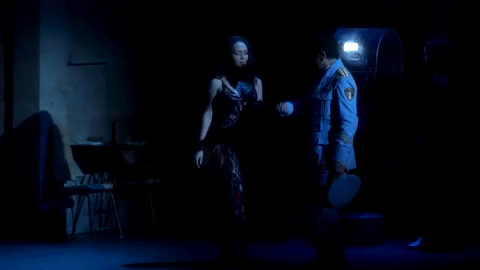At the beginning of The Band’s Visit, the musical by Itamar Moses and David Yazbek that swept the Tony Awards with 10 wins, a projection tells us that once, an Egyptian orchestra visited a small Israeli community for a night. “You probably didn’t hear about it,” the projection reads. “It wasn’t very important.”
After the Tonys, no one in the entertainment industry or the world of Jewish popular culture can claim they haven’t heard about The Band’s Visit, a true sleeper hit, a story of Jewish and Arab connection that shows us how to be our authentic selves in the midst of uncertainty.
Based on a 2007 Israeli film, The Band’s Visit shows how a linguistic mix-up can lead to unexpected friendships. When band member Haled (Ari’el Stachel) orders bus tickets to Petah Tikva, a city outside Tel Aviv, the Israeli clerk misunderstands his accent and sends the group to Bet Hatikva, a fictional Negev town that boasts neither an Arab Cultural Center nor any Arabs. Stranded without lodging and unable to get to their gig on time, the band takes solace in Dina (Katrina Lenk)’s café.
And then, nothing much happens. Young men feel awkward and freeze up trying to talk to young women. The band members and townspeople bond over lost loved ones, unraveling marriages, and the consuming disappointment of not being the person others wanted you to be. Above all, the Arabs and Israelis bond over the mighty timbre of their music’s shared roots: Avrum (Andrew Polk) sings of winning his late wife’s heart with a song, while Dina and the reluctantly smitten conductor Tewfiq (currently Dariush Kashani, though Tony Shalhoub originated the role on Broadway and won the Tony for his performance) connect and (almost) fall in love over their shared love of Egyptian movies and music. The characters communicate in their common language of English, but really, they talk through music, letting the rhythm speak for whatever’s on their minds.
As a lifelong theatre fan and fledgling artist, it is invigorating to see a musical in which the themes are explored and unearthed through beautiful and nuanced characters rather than through kitschy plot twists. The Band’s Visit is about an otherwise uneventful night in a town the leading lady describes as “blah, blah, blah,” but its emotional effectiveness lies in its minimalistic candor.

The brilliance of The Band’s Visit – and what has eluded other pieces of theatre about Israel – is its depiction of Arabs and Israelis sharing advice, love, pain, and friendship without overt mention of the conflict. It is there, of course, in the guns strung casually across two women’s backs; in the penetrating nervousness of the bandmates in Israeli homes; in Tewfiq’s simple warning to Haled to “be careful” before ordering bus tickets. But the seamless integration of Arab-Israeli relations reminds audiences that the longstanding conflict is a part of the everyday lives of these characters and their many real world counterparts. The Band’s Visit resonates far and wide because of its simplicity in telling stories of human connection beyond borders. It does not overly assert its politics or overstay its welcome, choosing instead to let audiences form their own opinions about the kindness and common ground of our supposed enemies through just one night in a sleepy desert town.
Near the end of the show, a longing lovesick man finally gets a return call from his absent girlfriend. In the subsequent song “Answer Me,” the characters come together to express their shared desire for someone to listen, to hear, and to respond. “And my ears are thirsty / For your voice, for your voice / Can you answer me?” Adam Kantor sings while arguing couples make up, new ones learn how to love, and a clarinet soars in the background. The projections from the beginning return to plead: “اجب / ענה לי / Answer me.”
While the show’s ending hints at what could have been, I was happy to see it lack an element so often forced onto Jewish stories: Jewish death. When was the last time you’ve seen a musical where Jews get a happy ending? The pogroms of Fiddler on the Roof force out the Jews of Anatevka, while the AIDS crisis tears up the Jewish family of Falsettos. Both stories speak to essential parts of our Jewish history that need to be told, but in an age when so many stories about Jews still end in death and despair, it was beyond refreshing to watch The Band’s Visit end with the same vivacity and dignity it held when the curtain first rose.
In truth, I was not expecting the Best Musical win at the Tony’s. The Band’s Visit is not a huge, showy musical with ornate sets, gorgeous ball gowns, or show-stopping tap dances (though Bill Army’s roller skating sequence is one for the ages, and he should take it on the bar mitzvah circuit stat). It is quiet but powerful in its declaration of the human spirit, like a soft-spoken friend whose wisdom and dorky Jewish dancing catches you by surprise. In the words of the inimitable Katrina Lenk, watching this show win Best Musical filled my “stupid little heart” with a lot of Jewish joy.



